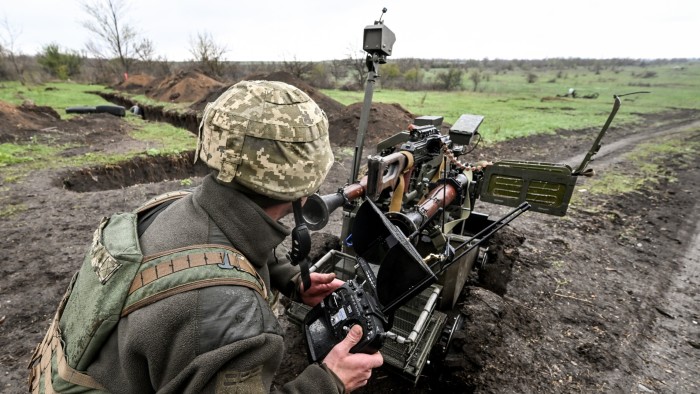Private investors are positioning themselves to play a key role in re-arming Europe by providing much-needed capital to help the defence industry scale up and boost the region’s industrial resilience.
More than three years since Russia’s full-scale invasion of Ukraine, Europe’s capitals have pledged billions of euros to invest in defence as well as in new technologies, but private equity and venture capital executives believe there is a funding gap that they could fill.
Governments “cannot by themselves be 100 per cent successful in rebuilding defence capabilities”, said Thomas Friedberger, deputy chief executive at Tikehau Capital, adding that private sector would be needed to drive investment in “defence, resilience and sovereignty”.
The private equity group, which has just raised close to €450mn towards a fund that will invest in companies focused on technology used for both civil and military applications, is among dozens of firms chasing opportunities in the sector.
Investment in European start-ups working on defence and related technologies jumped 24 per cent last year to $5.2bn as investor appetite for companies such as software AI group Helsing and drone maker Tekever defied the broader downturn in European VC funding.
Although private capital investment in the aerospace and defence industry stretches back decades, it has long been dominated by larger buyout funds able to navigate operating in a highly regulated sector.
Yet investor interest, also from VC funds, has surged following Russia’s invasion of Ukraine and as governments have sought to bolster their defence industrial bases. Donald Trump’s cold shoulder to Nato and calls for Europe to spend more on its own security have only turbocharged such efforts.
Many VCs, particularly in Europe, have in the past been wary of backing weapons manufacturers because of the risk of running foul of environmental, social and governance rules.
Executives believe they can play a role by investing in capital hungry start-ups while also helping larger players to increase production capacity, bringing down unit costs.
Private markets will play a key role in filling the defence funding gap in Europe,” said Ali Floyd, co-head of European private equity fundraising at advisory firm Campbell Lutyens.
Governments, he added, were “unwilling to spend much more taxpayers’ money to finance defence investments, and there are only so many Rheinmetalls and BAE Systems that the public markets can fuel”.
The funding gap in Europe was “growing because of current questions around America’s commitments to Nato and there is also a European desire to fund more of Ukrainian defence”, said Michael Sion, partner at consultants Bain & Co, and author of a recent report that showed the value of venture capital deals in the defence sector has increased 18-fold in the past decade.
The war in Ukraine has underlined the increased role that defence technology will play on the battlefield, from drones and other autonomous systems to robotics and artificial intelligence. Executives said private equity and venture capital funds can help to drive innovation by investing in early stage technology.
We need “private capital to create companies, to take the risk, to innovate and invest in research and development ahead of production”, said Sten Tamkivi, one of the co-founders of Plural, an early-stage technology fund that was one of the early backers of Helsing with about €800mn under management.
Many investors are also on the lookout for deals to take advantage of companies that are underperforming or have broad portfolios that lend themselves to restructuring.
Recent data from PitchBook showed that the deal count in the global aerospace and defence sector increased last year, with 274 transactions — the most of any year in the past decade. The total value of the deals in the sector in 2024 was $36.8bn — up $10bn, or 37 per cent, from 2023.
James Dawson, a partner at boutique investment bank Gleacher Shacklock, said “more of the substantial PE firms are interested in defence now than they have been historically”.

Dawson points to the successes that US buyout group Advent International has had with its purchases of Britain’s Cobham and Ultra Electronics. Ultra makes submarine-hunting equipment as well as control systems for the fleet of Trident submarines that carry the UK’s nuclear deterrent.
Although the UK government stepped in to secure binding commitments from Advent in relation to both acquisitions, the deals were given the go-ahead. “Everyone has seen the success of Advent and they’ve seen the success they’ve had with the government,” said Dawson.
Whether the sector will see more high-profile M&A is unclear. Chemring, the UK-listed explosives maker, earlier this year received a £1.1bn approach from US-based Bain Capital. Chemring did not comment at the time.
According to Dawson, high valuations are a barrier to M&A in defence although there are plenty of discussions about collaborating on more joint ventures.
Despite the influx of money into the sector, challenges remain if Europe wants to build a defence technology sector harnessing the money from private investors. Plural’s Tamkivi said governments needed to fix their notoriously bureaucratic procurement methods, which prioritised larger contractors.
Governments, he said, needed to “make sure that if new technology companies are born in Europe and funded by private capital [that] they have access to procurement flows”.
Europe, he added, needed the right mechanisms to deal with the smaller companies. “How do you create a future large business out of an SME — that is the venture capital game.”
However, attitudes to investing in defence had shifted significantly and the interest in the sector was unlikely to wane, said executives, even if there was a ceasefire between Ukraine and Russia.
The “mood is changing with investors, probably also with regulators, probably also with governments”, said Tikehau’s Friedberger, adding that “there won’t be any sustainable economic development without defence”.

